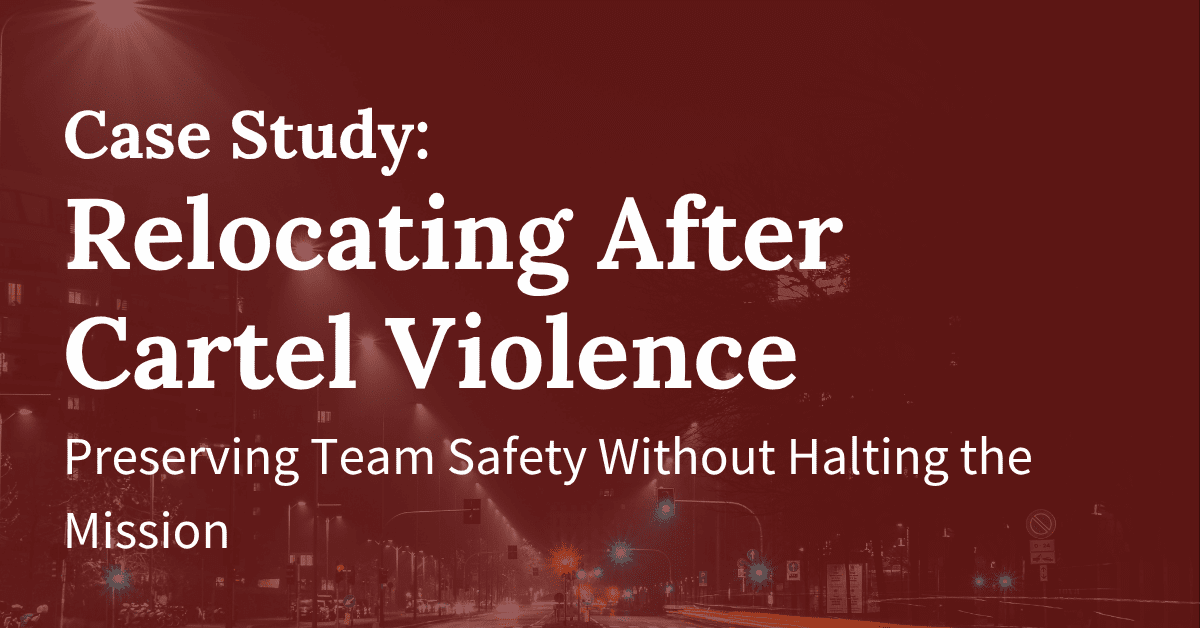
When violence erupts near your operations, decisions compress into moments. A staff member's close friend was executed at a traffic light in broad daylight, in front of his young daughter. The killing was cartel-related. It happened minutes from where the team worked every day.
What followed wasn't panic—but it wasn't calm either. Staff who had once felt insulated from regional violence now understood they weren't. Field operations halted immediately. Rumors spread faster than facts. And without clear direction from leadership, fear began making decisions that strategy should have owned.
The client faced a choice with no good options: stay visible and hope the violence didn't escalate further, relocate hastily and risk losing institutional knowledge, or find a third path that prioritized people without abandoning the mission. With staff safety non-negotiable and organizational continuity equally critical, they contacted Pholus. What unfolded over the next two weeks became a study in controlled crisis response—how to move an entire operation under pressure without losing the team that made it work.
Sudden security deterioration near your operations where violence has escalated from distant threat to immediate reality, affecting staff perception of safety and willingness to continue work. You need to assess whether relocation is necessary, where to relocate to, and how to execute without losing your team or abandoning your mission in the process.
Staff trauma and operational paralysis following violent incidents that directly or indirectly affect your team members. Fear is spreading faster than facts, field operations have stopped, and you need to restore both psychological safety and operational continuity without dismissing legitimate concerns or forcing people back into situations they no longer trust.
The need to relocate operations under time pressure while maintaining institutional continuity, preserving vendor relationships, managing stakeholder communication, and avoiding the appearance of retreat or organizational collapse. You need a controlled transition that prioritizes people while protecting long-term viability and reputation.
Operating in cartel-influenced or high-crime regions where organized violence creates cascading risks—reputational, operational, and psychological—that standard security protocols don't address. You need someone who understands how criminal networks operate, what visibility means in these contexts, and how to reduce exposure without shutting down entirely.
Stakeholder communication challenges during crisis where board members, donors, and partners are geographically distant, culturally removed from the operating environment, and struggling to distinguish between manageable disruption and existential threat. You need messaging that acknowledges reality without triggering panic, funding withdrawal, or loss of institutional confidence in your leadership.
● Operations fully restored within 10 business days with zero client service interruptions or contract violations
● 100% staff retention—not a single resignation despite direct exposure to cartel violence in their community
● Zero safety incidents recorded at new location over 18+ months of continued operations
● Relocation executed 18% under projected budget while upgrading security infrastructure and facility quality
● Client satisfaction scores maintained at 94% throughout transition period—no attrition, no renegotiations, no visibility into internal crisis
● Original facility has since fallen into urban blight and experienced three additional violent incidents—validating the permanent exit decision
We moved into immediate containment mode the moment violence touched the organization's operational perimeter. Our mission was clear: assess whether the location was still viable, stabilize staff psychologically so decisions weren't driven by panic, and execute a relocation that preserved both the team and operational continuity without abandoning the mission or triggering stakeholder alarm.
We advised the client to formally suspend all in-person activity for 10 business days. This gave staff time to process what had happened, prevented hasty individual departures that could cascade into full team collapse, and created space to assess the threat environment without the pressure of maintaining daily operations. It also prevented public social media exposure from frightened staff that could signal organizational vulnerability or create reputational exposure upstream.
We conducted a rapid location risk assessment focused on proximity to the existing base, allowing for minimal disruption to transport routes, vendor contracts, and staff commutes. We pulled data on recent cartel activity from local news and unofficial community sources, interviewed trusted stakeholders who understood the security landscape, and identified viable fallback sites with natural security advantages, lower visibility, and infrastructure capable of supporting immediate resumption.
Once a secure alternative was selected, we helped the organization renegotiate vendor contracts for the new location, establish a lower-profile security posture with enhanced private protection, and create a transparent framework for relocation cost review and post-move evaluation that could be presented to stakeholders without triggering panic about financial stability or organizational competence.
We drafted communication protocols to ensure transparency without sensationalism. Stakeholders needed context that explained why the move was necessary without overstating the threat or creating the impression that the entire mission was collapsing. We also advised against returning to the original site even if conditions improved, because the reputational and psychological risks had become embedded in staff perception and would undermine retention and morale long-term.
This case study includes the complete rapid relocation framework we deployed under crisis conditions, how we conducted real-time security assessments while operations were suspended to identify safer locations without exposing staff to additional risk, the stakeholder communication strategy we used to maintain confidence without downplaying legitimate security concerns, and the exact vendor coordination and governance process we followed to relocate an entire operation in under two weeks without losing a single staff member, disrupting mission continuity, or triggering donor withdrawal.
If your team is operating in a cartel-influenced region, experiencing escalating violence near your operations, or navigating the impossible decision between staff safety and mission continuity, we can help. Pholus specializes in rapid crisis response and controlled relocations in environments where standard security protocols don't address the real threats your people face on the ground.